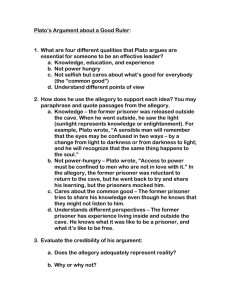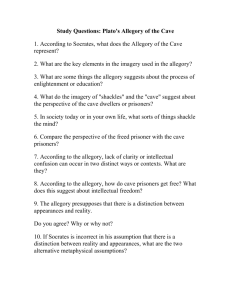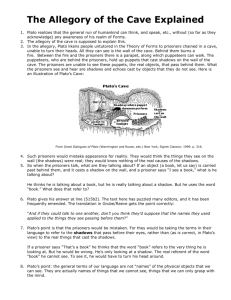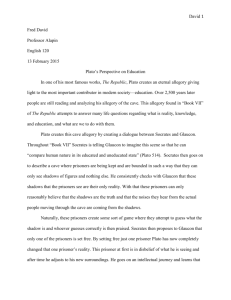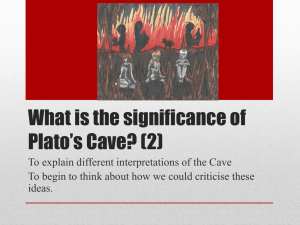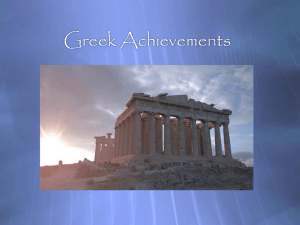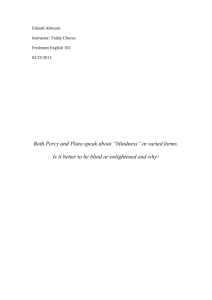The Ascension towards Enlightenment - English 102
advertisement
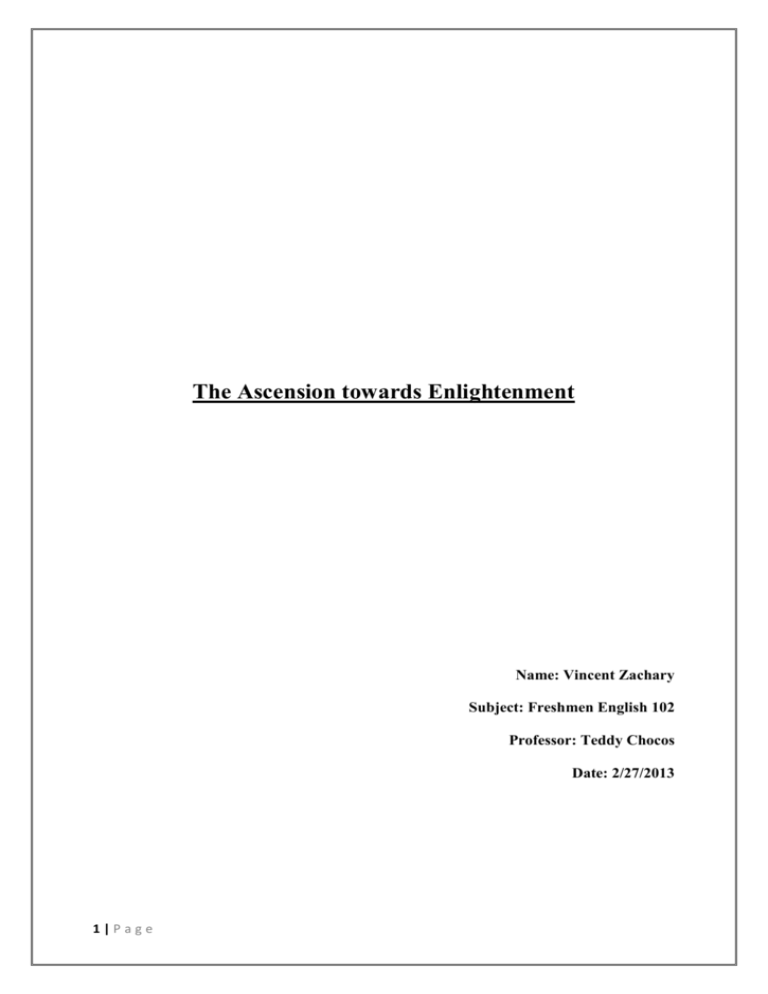
The Ascension towards Enlightenment Name: Vincent Zachary Subject: Freshmen English 102 Professor: Teddy Chocos Date: 2/27/2013 1|Page Born in the BC Era of Ancient Greek, Socrates is one of the most renowned pioneers in the field of philosophy, the study of the fundamental nature of knowledge, reality, and existence. Under his tutelage, Socrates mentored a devout follower who was not only his best student, but also the person who is solely responsible for eternalizing Socrates’ teachings and philosophical beliefs. His name is Plato. Famed for using dialogue settings in his works, Socrates is involved as a character in most of them, teaching his students through conversations. In one of Plato’s metaphorical work, the “Allegory of the Cave”, he wrote a dialogue between Socrates and his brother, Glaucon, which highlighted the importance of truth and knowledge “beyond the world of sensory perception”. This allegory represents the different stages of mental processes in which a person has to go through in order to achieve a mighty sense of rationality, the “source of reason and truth”, which is a true understanding of being able to think and form judgements by the process of logic. This, according to Plato, is the highest state of intelligibility that anyone can ever achieve. The “Allegory of the Cave” is one of the most complex and brilliant philosophical work in the history of Western philosophy. In the dialogue, Plato stresses how unenlightened and “blind” human beings are towards their understanding of rationality, and that everyone starts at the first stage of that being, relying on bodily senses to attain a comprehension and awareness of truths. However, in accordance to the stages illustrated in the “Allegory of the Cave”, being blind is a contributing step of the path towards enlightenment. Therefore, it is not a question of whether humans are better off being blind or enlightened; people have to be blind first, in order for them to be enlightened. Thus, it is of utmost importance to understand that being blind towards realities is a stage where every human being has to go through, and through education, it will lead to personal choice, experience and self- reflection; the last essential steps towards the stage of enlightenment. 2|Page In the first part of the “Allegory of the Cave”, Plato gave an example through a dialogue in which Socrates explained how human beings are trapped in a cave, chained up and immobilised in such a way that they can only look straight at a blank wall. Behind them is a great fire, and in between the imprisoned humans and fire is a raised way. Along this raised way there will be people carrying various statutes of animals and objects. Their shadows are then casted on the wall which the humans are facing, and these humans are forced to look at these images from young. The truths about the world, to them, are represented by the shadows of these images. In order to understand Plato’s metaphor, one has to know the fundamental concept of how a shadow exists. Shadows only exist when light is present, therefore they are not entities, which are things that exist by themselves. The statues, objects and humans on the raised way are entities; they are real and they represent the realities of the world. Therefore, when the shadows of these entities are casted on the wall, the imprisoned people are only taking in imperfect or distorted representations of realities. This renders them incapable and impossible in capturing a holistic view of what is real, for they rely on their imaginations or assumptions to fabricate the truths of the world, without using actual and concrete proof. Plato agrees to this statement when he wrote, “The truth would be literally nothing but the shadows of these images.” The reason for this inability is due to the fact that they are not educated enough to differentiate what is real and what is not. All their lives they have only been exposed to these imperfect representations of realities, relying on their sensory perception to deduce the facts of the world they are living in. Thus, it is only logical for humans, who are experiencing a similar stage, to accept them as truths and be blind towards anything which is the contrary, for they do not know that the true reality exists beyond their perceived reality. 3|Page This brings Plato to explain about the next stage of mental processing, putting education into the equation. Plato believed that education is an essential factor for people to be enlightened about truths and to help them turn away from the delusions of the previous stage. In this stage, in context to the allegory, the prisoners are placed in a scenario where they are released. These prisoners were also “disabused of their error”, which means that they are freed from the deceptions and errors of their initial beliefs in the shadows. This is the first step of enlightenment which education can bring about. When a prisoner is forced to move his body and walk towards the fire, the experience of moving and seeing light for the first time will be newfound discoveries. He began to feel pain from moving his body as he was immobilised for a great part of his life, and the rays of light from the fire are be too blinding for him; these feelings will feel unnatural to him at first. Furthermore, these lead him to a shocking revelation; that the shadows of the images in the previous stage are distorted realities. The prisoner is naturally baffled by the new reality, for it is an abstruse area for him. Furthermore, it wants him to realise that the life he has led, was all along a lie. Logically, if a human has a strong attachment to his personal beliefs, he will not be easily swayed to the idea of them in being false; these beliefs, in his eyes, have been verified as the truth for a long period of time. Plato agrees when he writes, “Will he not fancy that the shadows which he formerly saw are truer than the objects which are now shown to him?” This is the stage of personal choice. Through this stage, Plato explained the pains caused by confusion and doubt which a person will experience when choosing what to believe. If a person has a particularly strong belief which had been stoutly upheld from young, only to discover in a later stage of his life that it was false, he will surely be distraught. Not only will 4|Page he feel a large hole in his life after knowing the truth, he will feel an immense sense of loss. He will then come face to face with a choice; either he will be ignorant and blind towards the real truth and fall back to the comfort of his belief, or he allows himself to be educated towards the path of enlightenment. If that man chose enlightenment, he will proceed to the next stage, experience. Plato puts the prisoner is another scenario whereby he is brought out of the cave. He is finally out in the open, the real world and the realm of the intellectual. The prisoner is not able to understand it at first sight, for he has always been entrapped in the cave of falsehood. Every object and being looks foreign and new to him. In order to live in this realm, the prisoner is to undertake the steps in experiencing the truth, and a period of time is essential for the prisoner. This statement is supported by Plato when he wrote, “He will require to grow accustomed to the sight of the upper world. And first he will see the shadows best, next the reflections of men and other objects in the water, and then the objects themselves.” Once a person chooses the pursuit of his newfound truth, it requires a period of time for him to adjust himself towards this belief. He needs to be educated slowly, learning one fact a time and foster the ability to differentiate fact from false. Although he is still more comfortable with the knowledge he gained from falsehood, he will begin to form logical thoughts against them, allowing him to see a clearer picture of reality. As he takes in the surroundings of this new reality, not only will his state of mind become stable, he will be slowly released from the conformity towards false notions. This is due to the process of self- reflection which he had undergone. When those notions have disappeared, he will finally reach the next stage, understanding. From this point onwards, he is no longer blind; he has placed himself in the state of reaching enlightenment. He is able to 5|Page see life and comprehend his nature through logical and rational thinking. This will then lead him to the last stage, the stage of understanding life and its truths completely, the stage of being enlightened. Not only will he be powerful in wisdom and knowledge, he will be able to live a life where knowledge and understanding is illuminated to his eyes. As the prominent philosopher Plato puts it, “Last of he will be able to see the sun, and not mere reflections of him in the water, but he will see him in his own proper place, and not in another, and he will contemplate him as he is;” Each and every stage is critical for a person has to undertake in order to be enlightened, be it beliefs or truths. By going through these stages, a person will be able to develop, not just a stronger ability to process knowledge mentally, but also an important life journey. However, this does not mean that all the people who undergo this complex process will be able to reach the final stage, for people have to free will to stop or continue in any stage they are in. In addition, this allegory highlights the important teachings of his teacher, Socrates. Socrates wanted every human to have a strong sense of rationality and develop critical thinking, overcoming the habit of being lazy when it comes to the latter aspect. Although Socrates believed that everyone “has the responsibility to think”, and “are all capable to live an examined life.” a person will not be able to achieve this state of thinking unless he is educated properly. Only through education, will a person be able to move from the state of being blind to the other stages. If humans, who have no capacity of knowledge, are to educate themselves about reality, they will never ascend towards the realm where understanding and truths, coexist as one powerful force. 6|Page Bibiliography Jacobus, Lee A. "Plato." A World of Ideas: Essential Readings for College Writers. Boston: Bedford/St. Martin's, 2002. N. pag. Print. http://www.youtube.com/watch?v=S24FxdvfOko&sns=em 7|Page
